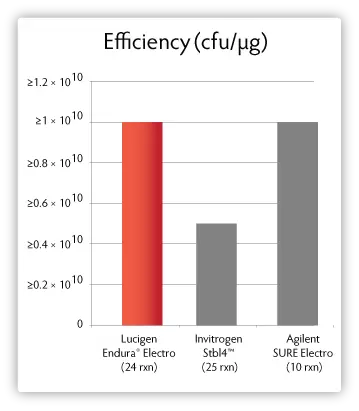Endura ElectroCompetent Cells (DUOS) (direct replacement for Stbl4 and SURE Electro cells) > 1 x 10e10 cfu/ug
| Specifications | |
|---|---|
| Competence: | Electroporation Competent |
| Application: | Large or Difficult Fragment Cloning, Lentiviral Genome Editing |
| Organism: | E. coli |
Product Description
- Clone unstable sequences (e.g. retroviral elements) with reliable results
- The cells of choice for propagating lentiviral constructs, e.g. CRISPR Cas9 lentiviral gRNA constructs and libraries, such as the GeCKO (Genome Scale CRISPR Knock Out) pooled lentiviral gRNA libraries.
- Direct replacement for Invitrogen Stbl3™ and Agilent SURE strain
- Stable Genotype without resistance marker
- Excellent value
- High efficiency: ≥ 1 × 107 cfu/ug
- Also available as Chemically Competent Cells (≥ 1 × 1010 cfu/ug)
Endura™ Competent Cells are a commonly used strain for cloning, maintaining and stably propagating sequences that suffer unwanted recombination events in other strains, e.g. inverted repeats or other sequences prone to recombination (commonly found for example in retroviral genes). Chemical or electrocompetent, whichever method of transformation you prefer, Lucigen's Endura cells give you higher efficiency at better prices.
Endura Competent Cells include Control DNA and Recovery Medium, and are packaged as DUOs (50ul aliquots for 2 transformations per tube). Recovery Medium is also available separately. The specified transformation efficiencies are with pUC DNA.
Features
Transformation Efficiency ≥ 1 × 1010 cfu/µg pUC DNA
Genotype
recA13 supE44 ara-14 galK2 lacY1 proA2 rpsL20(StrR) xyl-5 λ– leu mtl-1 F– mcrB mrr hsdS20(rB–, mB–)
Supporting Data

Figure 1. Transformation efficiencies of electrocompetent clone-stabilising strains
Custom Configurations
Please contact us for more information related to custom competent cell services or to receive a bulk quotation.
Product Citations
- Sanjana NE et al. (2014) Improved vectors and genome-wide libraries for CRISPR screening. Nature Methods 11(8): 783–784
- Shalem O et al. (2014) Genome-Scale CRISPR-Cas9 Knockout Screening in Human Cells. Science 343 (6166): 84-87.

